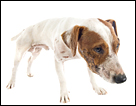Your Dog Has Allergies, Too
Is your dog itching? It could be allergies. But what's causing it? There are several possibilities, but once you know the cause, you can take action to give your pooch some relief.
Year-round canine allergies
Food. Food allergies are actually rare in dogs, with only about 15 percent of canines being allergic to food. A dog may be sensitive to a protein source in his food or the protein of grains like wheat, soy, or corn. Try feeding your pet food with a different grain content or protein source for six weeks and see if there's any improvement.
Mold. If you live in a humid place or if your kitchen and bathroom are unventilated, mold spores could be the culprit. Where moisture is present, so is mold. To prevent mold from growing, decrease the humidity in your house by turning on the air conditioner on a regular basis, repairing any leaks, running the exhaust fan after showering, and using the one over the stove when cooking.
Other animals. Male and long-haired cats produce more of the allergen FelD1 than female and short-haired felines. This protein is present in cat saliva and their anal sacs. Cat allergen, which sticks to walls and furniture, stays active for at least 10 years. The best solution is to bathe your cats regularly.
People. Just like cats, humans put out allergen. It can be found in our skin, which flakes off all the time. Your dog may be allergic to you or another family member. The remedy for this is allergy shots.
Other dogs. Dogs that spend plenty of time outdoors can carry pollen on their fur. A shake is all it takes for it to spread around the house. Again, keep everybody clean.
Seasonal canine allergies
Seasonal allergies are the most common cause of dog itching and scratching. A scratch test at your vet's clinic, which normally costs a few hundred dollars, is the best way to figure out what's behind your dog's seasonal allergies. You can also ask yourself what you're allergic to. For some reason, people and pets are usually allergic to the same things.
Otherwise, you can do some detective work by watching your local TV news' weather segment. An allergy report will tell you which pollens or mold are a problem that day. Track the daily pollen count and observe when your dog is scratching to get a good idea of what's to blame for the allergy.
In general, the earliest spring pollens come from trees, followed by grass pollen. Flower pollen and large pollen are typically not an issue, but insects are a seasonal problem as well.

 Durable Dog Toy Outlasts the Strongest Jaws
Durable Dog Toy Outlasts the Strongest Jaws
 Disadvantages And Advantages Of Dog Boarding Solutions Online
Disadvantages And Advantages Of Dog Boarding Solutions Online
 Alabama Rot and the Danger of Dog Walking
Alabama Rot and the Danger of Dog Walking
 Top 5 Tips to Potty Training a Puppy
Top 5 Tips to Potty Training a Puppy
 Regurgitation and Vomiting Differences in Dogs and Cats
Regurgitation and Vomiting Differences in Dogs and Cats
 Cane Corso Breeder Interview Breeder Interview: Virginia Dunn Discusses The Great Italian Mastiff
Cane Corso Breeder Interview Breeder Interview: Virginia Dunn Discusses The Great Italian Mastiff